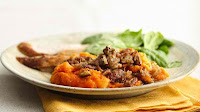When it comes to eating healthy, the phrase "eat like a rainbow" is the mantra we all should seek to live by. By getting a variety of different colored fruits and vegetables you not only maximize your intake of a broad range of nutrients, you are also guaranteed a diverse amount of essential vitamins and minerals. "Nature has endowed each fruit and vegetable variety with certain vitamins, minerals, fibers and more," said Lilan Cheung, director of health promotion and communication with the Harvard School of Public Health.
Everyone should be eating nine or more servings of fruits and vegetables per day," Cheung said. "The more, the better!"No single food contains all the necessary nutrients, but different plant color groups when eaten in combination fulfill the average person's daily requirements.
• Red: Tomatoes, beets, radishes,
red bell peppers. Lycopene, found in tomatoes, is known to reduce prostate
cancer risk.
• Green: Spinach, broccoli, brussels
sprouts, cabbage, green peppers, kale, collard greens, peapods, asparagus.
"Phytochemicals lutein and zeaxanthin are found in spinach, collards, kale
and broccoli," Cheung said. "These antioxidants may protect the eyes
and fight against free radicals - harmful substances in our body caused by
smoke and pollution."
• Yellow and orange: Carrots,
pumpkins, yellow peppers. Especially rich in beta-carotene, which strengthens
the immune system.
• Blue and purple: Eggplant. Loaded
with antioxidants called anthocyanins that may prevent heart disease by
blocking the formation of blood clots.
• White: Garlic, white onions.
"These pungent vegetables add flavor to foods so you can cut back on the
salt," Cheung said. "The onion family contains allicin, which has
anti-tumor properties. Garlic is being studied for its potentially beneficial
role in preventing heart attacks and strokes, although the research is still
preliminary."
Food
|
May
prevent
|
Nutrients
|
Notables
|
Beans (such as chickpeas, lentils, black beans, lima beans)
|
Colorectal cancer
|
Fiber and phytochemicals
(saponins, protease inhibitors, and phytic acid)
|
Phytochemicals have been shown to
slow the growth of tumors, and researchers have identified probable evidence
that fiber protects against cancer. Beans are also a great source of
vegetable protein, which is helpful if you are limiting red meat intake.
|
Berries
|
Skin, bladder, lung, esophageal,
colorectal, and breast cancers
|
Vitamin C, fiber, and
phytochemicals like ellagic acid, flavonoids, and antioxidants
|
Blueberries contain
anthocyanosides, possibly the food kingdom's most potent antioxidants, which
attack cell-damaging free radicals.
|
Cruciferous vegetables (broccoli, cauliflower, cabbage, brussels sprouts, bok
choy)
|
Many cancers, including
colorectal, breast, oral, gastrointestinal, endometrial, lung, liver, and
cervical cancers
|
Fiber, folate, glucosinolates,
crambene, indole-3-carbinol, and isothiocyanates
|
Studies suggest these veggies
fight cancer by regulating enzymes in the body.
|
Dark leafy greens (spinach, kale, collard greens, Romaine lettuce)
|
Mouth, pharynx, larynx, stomach,
breast, skin, and lung cancers
|
Fiber, folate, carotenoids,
saponins, and flavonoids
|
Research suggests the carotenoids
act as antioxidants, eliminating possible cancer-causing free radicals from
the body.
|
Flaxseed
|
Colon, breast, skin, and lung
cancers
|
Omega-3 fatty acids, lignans
(plant estrogens), alphalinolenic acid
|
Flaxseed contains more lignans
than any other known food. These phytoestrogens seem to mimic the hormone
estrogen. Note that flaxseed oil does not naturally contain lignans.
|
Garlic (and other allium vegetables such as onions, scallions,
leeks, chives)
|
Stomach, colon, prostate, bladder,
skin, lung, esophageal, and breast cancers
|
Allicin, allixin, allyl sulfides,
quercetin, and organosulfur compounds
|
Research shows a “dose-response
relationship” with garlic. That is, the more you eat, the higher the
protective benefits.
|
Green tea
|
Colon, liver, breast, prostate,
lung, skin, bladder, stomach, pancreas, and esophageal cancers
|
Catechins, a type of flavonoid,
which are potent antioxidants
|
A 2007 study by Japan's National
Cancer Center showed that men who drank five or more cups a day may reduce
the risk of advanced prostate cancer by 48 percent.
|
Pomegranates
|
Prostate, lung, skin, and colon
cancers
|
Antioxidants, polyphenolic
flavonoids
|
Researchers say pomegranates,
which have high levels of antioxidants, have more anti-inflammatory properties
than green tea or red wine.
|
Red and purple grapes
|
Lymph, liver, stomach, skin,
breast, and leukemia cancers
|
Resveratrol, a type of polyphenol
|
Resveratrol has antioxidant and
anti-inflammatory properties. Although wine contains resveratrol, research
also shows a link between alcohol and other types of cancer, so it's not the
best choice. Jam and raisins don't contain much; eat fresh dark-colored
grapes.
|
Soybeans (also soy milk, soy yogurt,tofu, edamame, soynuts)
|
Breast and prostate cancers
|
Phytoestrogens called isoflavones,
saponins, phenolic acids, phytic acid, and protein kinase inhibitors
|
Researchers believe soy
isoflavones mimic hormones in the body, which may translate to
cancer-fighting capabilities. Researchers also recommend that because of
possible hormone mimicking, women taking anti-estrogen medicines should limit
or avoid soy until more is known.
|
Tomatoes
|
Most notably, prostate cancer;
also breast, lung, and endometrial cancers
|
Lycopene, an antioxidant
|
It appears the red fruit's cancer-fighting
potential is higher when the tomato is in sauce, juice, or paste form.
|
Whole grains (such as brown rice, whole-wheat bread, oatmeal, popcorn)
|
Colorectal cancer
|
Fiber, antioxidants, phenols,
lignans, phytoestrogens, and saponins
|
The phytochemicals from whole
grains appear to protect cells from the damage that can lead to cancer. The
disease-fighting nutrients and fiber found in the bran and germ of grains are
stripped out in the milling of refined grains like white flour, white rice, and
pasta.
|














